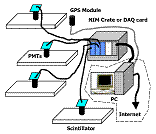Department of Physics and Astronomy: Publications and Other Research

Gregory Snow Publications
Document Type
Article
Date of this Version
2016
Citation
PHYSICAL REVIEW D 93, 122005 (2016) DOI: 10.1103/PhysRevD.93.122005
Abstract
The Auger Engineering Radio Array (AERA) is part of the Pierre Auger Observatory and is used to detect the radio emission of cosmic-ray air showers. These observations are compared to the data of the surface detector stations of the Observatory, which provide well-calibrated information on the cosmic-ray energies and arrival directions. The response of the radio stations in the 30–80 MHz regime has been thoroughly calibrated to enable the reconstruction of the incoming electric field. For the latter, the energy deposit per area is determined from the radio pulses at each observer position and is interpolated using a two-dimensional function that takes into account signal asymmetries due to interference between the geomagnetic and charge-excess emission components. The spatial integral over the signal distribution gives a direct measurement of the energy transferred from the primary cosmic ray into radio emission in the AERA frequency range. We measure 15.8 MeV of radiation energy for a 1 EeV air shower arriving perpendicularly to the geomagnetic field. This radiation energy—corrected for geometrical effects—is used as a cosmic-ray energy estimator. Performing an absolute energy calibration against the surface-detector information, we observe that this radio-energy estimator scales quadratically with the cosmic-ray energy as expected for coherent emission. We find an energy resolution of the radio reconstruction of 22% for the data set and 17% for a high-quality subset containing only events with at least five radio stations with signal.


Comments
© 2016 American Physical Society
Used by Permission